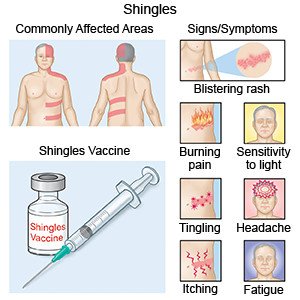Shingles Vaccine
Medically reviewed by Drugs.com. Last updated on Aug 4, 2025.
What is the shingles vaccine?
The shingles vaccine is an injection to protect you from the varicella-zoster virus. This virus causes chickenpox. The virus stays in your body after you have chickenpox, without causing any symptoms. Shingles occurs when the virus becomes active again and causes a rash. The rash can be dangerous if it is near one of your eyes. The vaccine is given in 2 doses. The second dose is usually given 2 to 6 months after the first. Your healthcare provider will tell you when to come back for the second dose.
 |
Who should get the shingles vaccine?
The vaccine is routinely given to adults 50 years or older. The vaccine may be given to adults 19 years or older who have a weakened immune system. You can get the shingles vaccine even if you do not know if you had chickenpox. You can also get the vaccine if you have already had shingles. The current vaccine does not contain any live virus. A live shingles vaccine is no longer used in the United States but may be used in other countries. Your healthcare provider can give you more information about the live vaccine, if needed.
What should I tell my healthcare provider before I get the shingles vaccine?
- You have any severe allergy.
- You have a weak immune system, such as from HIV, cancer, or cancer treatment.
- You are breastfeeding. Your provider will tell you if it is okay to get the vaccine while you are breastfeeding.
What are reasons I should not get the shingles vaccine?
- You know you have a severe allergy to any part of the shingles vaccines.
- You had a severe allergic reaction to the first dose of the vaccine.
Related medications
Treatment options
The following list of medications are related to or used in the treatment of this condition.
- measles virus vaccine/mumps virus vaccine/rubella virus vaccine/varicella virus vaccine
- ProQuad
- Rotarix
- RotaTeq
- rotavirus vaccine
What are reasons I should wait to get the shingles vaccine?
- You currently have shingles.
- You are sick or have a fever on the vaccine appointment day.
- You know or think you are pregnant.
What are the risks of the shingles vaccine?
You may develop a rash that looks like chickenpox near the injection site. The site may be red, sore, swollen, or itch. You may get shingles even after you receive the vaccine. You may have an allergic reaction to one or both doses of the vaccine. Rarely, this can be life-threatening.
Call your local emergency number (911 in the US) if:
- You have signs of a severe allergic reaction, such as trouble breathing, swelling in your throat, or hives.
When should I seek immediate care?
- You have a high fever or any symptoms that concern you.
When should I call my doctor?
- You have questions or concerns about the shingles vaccine.
Care Agreement
You have the right to help plan your care. Learn about your health condition and how it may be treated. Discuss treatment options with your healthcare providers to decide what care you want to receive. You always have the right to refuse treatment. The above information is an educational aid only. It is not intended as medical advice for individual conditions or treatments. Talk to your doctor, nurse or pharmacist before following any medical regimen to see if it is safe and effective for you.© Copyright Merative 2025 Information is for End User's use only and may not be sold, redistributed or otherwise used for commercial purposes.
Learn more about Shingles Vaccine
Treatment options
Care guides
- Chickenpox Vaccine
- Chickenpox Vaccine for Children
- The Importance of Immunizations (Vaccines) for Adults
- The Importance of Immunizations (Vaccines) for Children
Medicine.com guides (external)
Further information
Always consult your healthcare provider to ensure the information displayed on this page applies to your personal circumstances.
